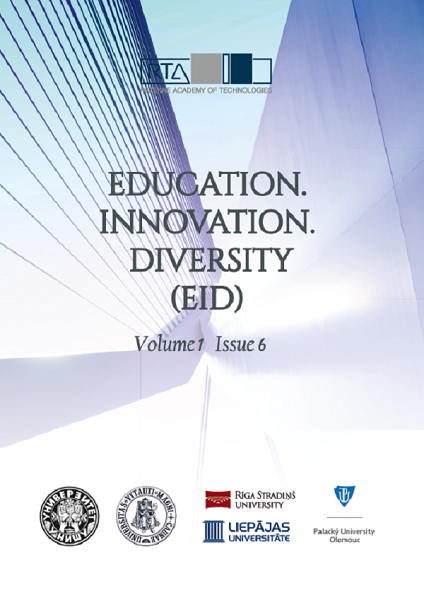THE POTENTIAL OF THE ESSAY IN FORMATIVE ASSESSMENT: LITERATURE REVIEW
DOI:
https://doi.org/10.17770/eid2023.1.7176Keywords:
essay writing, foreign language learning, formative assessment, writing skillsAbstract
This scientific research explores the potential of using essays as a formative assessment tool in the context of the competencies approach. The competencies approach emphasises the importance of focusing on learning progress and needs to promote successful learning, thus formative assessment plays a pivotal role in facilitating effective learning. The study highlights the significance of essay writing in promoting critical thinking, problem-solving, and self-directed learning. However, students often perceive essays solely as a means of summative assessment, lacking a comprehensive understanding of the assessment criteria. To address this issue, the research emphasizes the importance of involving students in the learning process by collectively defining outcomes, establishing assessment criteria, and providing constructive feedback. Clear objectives and feedback are crucial in fostering self-regulated learning and lifelong learning. The study highlights the need for student-teacher collaboration to enhance students' attitudes towards learning. Challenges in implementing formative assessment, such as providing quality feedback to each student, are acknowledged. In the context of foreign language learning, essays serve as valuable tools for formative assessment, providing insights into students' learning achievements. Furthermore, the development of criteria for self-assessment and self-regulated learning skills is essential for effective formative assessment.
References
Akram, M., Siddiqa, A., Nami, A. G., Shahzad, W., & Rashid, M. (2020). Essay Writing and Its Problems: A Study of ESL Students at Secondary level. International Journal of English Linguistics, 10(6):237.
Andrade, H. (2019). A Critical Review of Research on Student Self-Assessment. Assessment, Testing and Applied Measurement, 4(87). DOI: 10.3389/feduc.2019.00087
Bērziņš, E. (2020). Vērtēšanas izmaiņas Liepājas Valsts 1. ģimnāzijā. Skola2030. Domāt. Darīt. Zināt. Retrieved from https://skola2030.lv/lv/jaunumi/blogs/vertesanas-izmainas-liepajas-valsts-1-gimnazija
Black, P., & William, D. (2005). Changing Teaching Through Formative Assesment: Research and Practice. OECD, Formative Assessment: Improving Learning in Secondary Classrooms. OECD.
Black, P., & William, D. (2015). Changing Teaching through Formative Assessment: Research and Practise. London.
Čakāne, L. (2018). skola2030.lv. Available: Formatīvā vērtēšana - kas tas ir? Retrieved from https://www.skola2030.lv/lv/jaunumi/blogs/formativa-vertesana-kas-tas-ir
Chen, A.-h. (2022). The Effects of Writing Strategy Instruction on EFL Learners’ Writing. English Language Teaching, 15(3). DOI: 10.5539/elt.v15n3p29
Dodge, J. (2009). 25 Quick Formative Assessments for a Differentiated Classroom. U.S.A.: Scholastic Inc.
Dunn, K., & Mulvenon, S. (2009). A Critical Review of Research on Formative Assessment: The Limited Scientific Evidence of the Impact of Formative Assessment in Education. 7.
Fahimi, Z., & Rahimi, A. (2015). On the Impact of Self-assessment Practice on Writing Skills. Procedia - Social and Behavioral Sciences, lpp. 730 – 736. DOI: 10.1016/j.sbspro.2015.06.082
Flaksa, G. (2021). Formatīvā vērtēšana un atgriezeniskā saite latviešu valodas un literatūras stundās. lvg.lv. Retrieved from https://www.lvg.lv/upload/Skolotajiem/Gunta%20Flaksa.%20Diplomdarbs.pdf
Fung, Y., & Mei, H. (2015). Improving Undergraduates’ Argumentative Group Essay Writing through Self-assessment. Advances in Language and Literary Studies, 6(5), 214-224. DOI:10.7575/aiac.alls.v.6n.5p.214
Gaybullaevna, D. N. (2021). Formative Assessment of Students Knowledge – as a Means of Improving the Quality of Education. Scientific Reports of Bukhara State University, 144-155. DOI:10.52297/2181-1466/2021/5/3/13
Graham, S., & Harris, K. (2019). Evidence Based Practices in Writing. New York: The Guilford Press.
Yan, Z., & Brown, G. (2017). A cyclical self-assessment process: towards a model of how students engage in self-assessment. Assessment & Evaluation in Higher Education, 42(8), 1247-1262. DOI:10.1080/02602938.2016.1260091
Jamrus, M., & Razali, A. (2019). Using Self-Assessment as a Tool for English Language Learning. English Language Teaching, 11. DOI:10.5539/elt.v12n11p64
Lam, R. (2010). The role of self-assessment in students’ writing portfolios: A classroom investigation. TESL Reporter, 43(2), 16-34.
Marni, S., Silvia, R., & Titik, H. (2019). Critical Thinking Patterns of First-Year Students in Argumentative Essay. Journal for the Education of Gifted Young Scientists, 7(3), 683-697. DOI:10.17478/jegys.605324
Ministru kabinets. (2019). likumi.lv. (I. Šuplinska, Red.) Noteikumi par valsts vispārējās vidējās izglītības standartu un vispārējās vidējās izglītības programmu paraugiem. Retrieved from https://likumi.lv/ta/id/309597
Nagowah, S., Nagowah, L.(2009). Assessment strategies to enhance students’ success. Conference Paper: "Teaching and Learning 2009". Retrieved from https://www.researchgate.net/publication/305032303_Assessment_Strategies_to_enhance_Students%27_Success
Sasser, N. (2018). What Are the Advantages & Disadvantages of Formative Assessment? Retrieved from https://classroom.synonym.com/advantages-disadvantages-formative-assessment-28407.html
Stiggins, R. (2011). Assessment Through the Students’ Eyes. Educational Leadership.
Stikute, E. (2006). Kritiskās domāšanas attīstīšana literatūras mācībās vidusskolā. Pedagoģija un skolotāju izglītība, 700, 138-145. lpp.
Valsts izglītības satura centrs. (2018). mape.skola2030.lv. Svešvaloda (angļu valoda). Svešvaloda I (angļu valoda). Pamatkursu programmas paraugs vispārējai vidējai izglītībai. Retrieved from https://mape.skola2030.lv/resources/388
Zimmerman, B., & Schunk, D. (2011). Handbook of self-regulation of learning and performance. Routledge/Taylor & Francis Group.
West, H., Malcolm, G., Keywood, S., & Hill, J. (2019). Writing a successful essay. Journal Of Geography in Higher Education, 43(4), lpp. 609-617. doi:10.1080/03098265.2019.1655720
Winget, M., & Persky, A. (2022). A Practical Review of Mastery Learning. Retrieved from https://www.ajpe.org/content/ajpe/early/2022/01/13/ajpe8906.full.pdf






